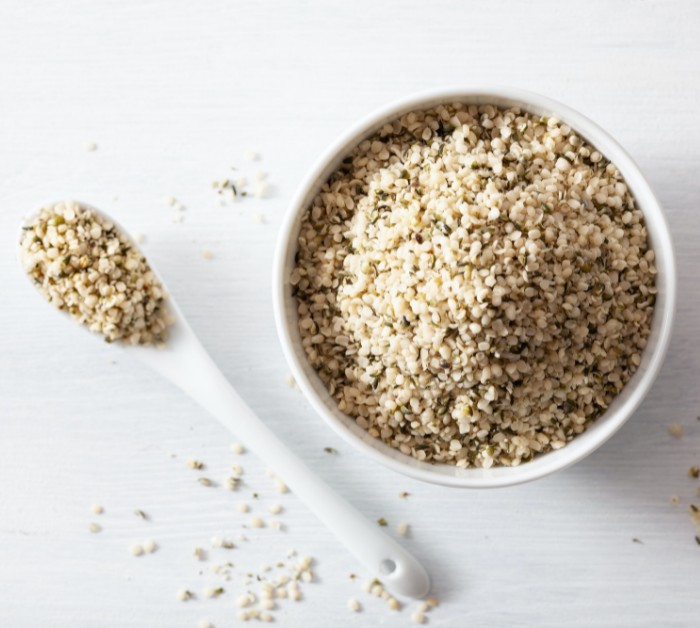Benefits of hemp seeds and possible side effects of eating too much
Tiny but quite mighty, hemp seeds are now considered a superfood and to reap the benefits you only need to add one tablespoon of hemp hearts to your diet. The best thing is that you can eat them raw or mixed in different meals.
If you’re already eating hemp seeds and you like their taste but you don’t know why they are good for you, then you are at the right place.
Here in this post, we will show you what are the benefits of hemp seeds, how to eat them, and what are the potential side effects when you eat too many hemp hearts.
But before we start with these topics here are some interesting facts about hemp:
- Hemp has a very short harvest life. It can be planted and harvested in 120 days.
- Hemp fiber can be used to make everything from skateboard decks to stealth fighter bodies, thanks to its next-level durability.
- The Vikings used hemp to make rope, sails, boat caulking, and more.
- China is the world’s biggest hemp producer. Its hemp industry is valued at over $200M.
- Hemp cultivation dates back 8,000 years to Mesopotamia, where it was woven into fabric.
This post may contain affiliate links, which means we may receive a small commission, at no cost to you, if you make a purchase through a link. For more information, please see our disclosure.
Where do hemp seeds come from?
Hemp seeds are the seeds from the hemp plant or Cannabis Sativa, which is a variety similar to the marijuana plant but very different in terms of the compounds it contains.
Marijuana contains relatively high levels of THC, the compound responsible for the mind-altering effects of the plant. Hemp is a related plant but it has very low levels of THC.
The flowers, leaves, and stems of the hemp plant do contain CBD. This is a compound thought to have health benefits but without the mind-altering effects of THC.
The seeds from the hemp plant, hemp seeds don’t naturally contain THC or CBD, but it’s possible for them to be contaminated with trace amounts from other parts of the plant during harvesting and processing.
Hemp is one of the most versatile plants on the planet. It’s used for industrial purposes because of its durable natural fibers and for its nutritional content. It’s used to produce high-quality clothing, textiles, paper, food, etc.
Hemp plants grow brown kernel-sized seeds. Inside these hard seeds, lie soft light green or white kernels. You can’t get a lot of nutritional value from unhulled seeds, so when you see a bag at the store labeled “hemp seeds” what you are actually buying is those soft inner kernels, also known as hemp hearts.
Hemp hearts can be pressed to make hemp seed oil, and the byproduct can be turned into hemp protein powder.
Are hemp seeds and hemp hearts the same thing?
Hemp seeds are the hard, crunchy seed of the plant. Hemp hearts are the hulled seeds, the same item but without the crunchy outer layer.
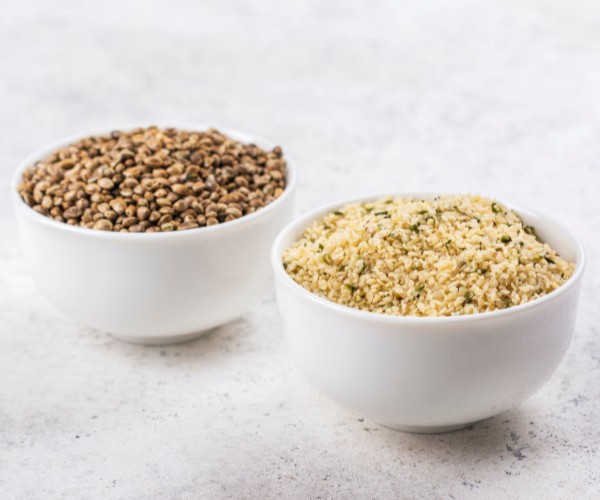
The main difference between hemp seeds and hemp hearts comes down to how you use them in your recipes. The benefits of hemp are the same in both of these products and it’s entirely up to you which version you prefer to enjoy.
Most of the time you will need an extra processing step to turn the seeds into hearts. But, there is actually no need to process hemp seeds at home, you can buy hemp hearts right from the Amazon store!
Nutritional benefits of hemp seeds
Hemp seeds are very nutritious. They are abnormally rich in two essential fatty acids alpha-linolenic acid (omega-3) and linoleic acid (omega-6).
Also, they contain gamma-linolenic acid, which is linked to many health benefits and we go deeper about this in our section for the health benefits of hemp seeds.
These seeds are a great protein source and 25% of their total calories are from high-quality protein. This is more than similar edible seeds like flaxseeds and chia seeds, whose calories are 16-18% protein.
They also contain high amounts of Vitamin E and minerals such as potassium, phosphorus, magnesium, zinc, iron, sulfur, calcium.
Here are the nutrition facts for 3 tablespoons hemp seeds according to USDA:
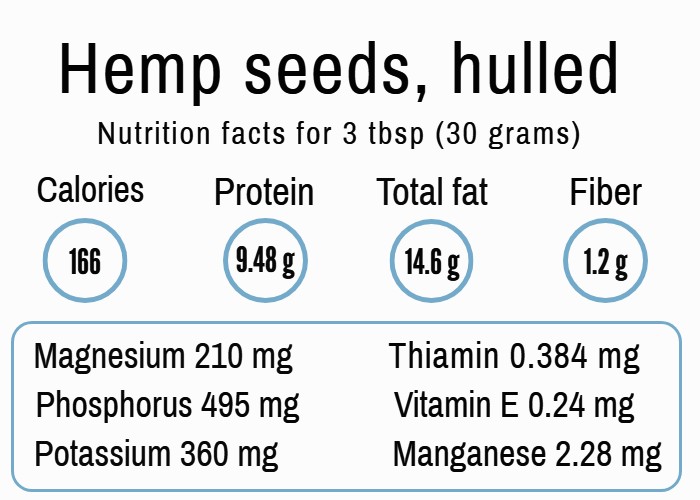
Protein
In every 30 grams or about 3 tablespoons of hemp seeds, there are 9.48 grams of protein. These seeds contain as much protein as soybeans, and by weight, they provide similar amounts of protein as beef and lamb.
Hemp seeds are considered a complete protein source. This means that they provide all the essential amino acids. When it comes to plant-based protein, very few plants offer complete protein sources, this is mostly due to a lack of the amino acid lysine.
Also, the digestibility of hemp protein is very good, it’s better than many nuts, grains, and legumes.
Omega-3 fatty acids
Hemp seeds are a great source of essential fatty acids, like alpha-linolenic acid (ALA) which is an omega-3. You should know that our body can’t produce essential fatty acids and they must be absorbed through the diet. They are essential for long-term health.
Omega-3s to omega-6s ratio is also important. People tend to eat more omega-6s and a few omega-3s. Adding hemp seeds to the diet may help to promote balance. Also, hemp seeds are low in saturated fats and don’t contain trans fats.
Fiber
Hemp seeds are a good source of fiber, and fiber is an essential part of your diet linked to better digestive health. Much of the fiber in hemp seeds lies in its outer shell, but even without the shell, hemp seeds contain 1.2 grams of fiber in just 3 tablespoons.
Consuming fiber every day is important and can:
- help with weight management
- help to stabilize blood sugar levels
- reduce the appetite
- promote healthy gut
Hemp seeds health benefits
Improved heart health
Hemp seeds contain high levels of omega-3 fatty and omega-6 fatty acids. Studies have shown that a healthy omega-3 to omega-6 intake is crucial for the prevention or reduction of cardiovascular diseases.
These seeds also contain a high amount of amino acid arginine which produces nitric oxide in your body.
Nitric oxide is a gas molecule that makes your blood vessels dilate and relax which leads to lower blood pressure and a reduced risk of heart disease.
Results from a 2005 study showed increased arginine intake corresponded with decreased levels of C-reactive protein (CRP). an inflammation marker – high levels of CRP are linked to heart disease.
Hemp seeds also contain gamma-linolenic acid which is also linked to reduced inflammation which may decrease your risk of heart disease.
May help your body convert food to energy
You can thank for this benefit of hemp seeds to thiamine and manganese content. According to NIH, thiamine more known as vitamin B1 helps your body break down carbohydrates so they can be used as energy.
This vitamin is also essential for the growth, development, and function of the cells in your body. Lacking this nutrient leads to reduced appetite, possible weight loss, memory problems, muscle weakness.
But don’t worry that’s why eating hemp seeds is good for you! Just 3 tablespoons of hemp hearts will give you 35% of your RDA (recommended daily allowance) of vitamin B1.
When we look at the manganese content, just a 3 tablespoon serving of hulled hemp seeds boasts nearly 130% of the recommended daily allowance of manganese.
This mineral according to the U.S. National Library of Medicine helps break down the starches and sugar you eat and process cholesterol, carbohydrates, and protein. This nutrient also helps support strong bones, a healthy immune system, and blood clotting (coagulation).
Whole hemp seeds may aid digestion
Fiber is an important part of your diet and is associated with better digestive health. Intestinal health, gut microbe balance, and gastric juices are delicate systems, and it’s important we take good care of them by adding fiber-rich foods to our diet.
High in soluble and insoluble fiber, containing 20% and 80% respectively, whole hemp seeds provide more than enough bulk to keep your gastrointestinal system regular. Additionally, this mixture of roughage feeds the probiotics in your gut and helps secure a robust immune system.
Insoluble fiber adds bulk to your stool and may help food and waste pass through your gut. Soluble fiber forms a gel-like substance in your gut, and it’s also a valuable source of nutrients for beneficial digestive bacteria.
Constipation relief – Another benefit of hemp seeds is that these edible seeds may provide some relief to those with constipation due to the fiber they provide.
In a study from 2012 published in the World Journal of Gastroenterology, researchers found that increasing your fiber intake helps to increase stool frequency in patients with constipation.
Rich in Gamma-linolenic acid (GLA)
Gamma-linolenic acid is a necessary building block for some prostaglandins-hormone-like chemicals in the body that help control inflammation, smooth muscles, and control body temperature, and are vital to other body functions.
Research published in 2016 indicates that GLA-supplemented diets reduce inflammatory responses. This really special omega-6 fatty acid is also found in borage and evening primrose. GLA-rich foods like hemp seeds have also been observed to help people with breast pain, menopause, PMS, skin allergies, obesity.
Hemp seeds and oil may benefit skin disorders
As we mentioned before hemp seeds are a great source of polyunsaturated and essential fatty acids. These seeds have about a 3:1 ratio of omega-6 to omega-3, which is considered in the optimal range.
Fatty acids may affect immune responses in your body. Your immune system depends on the balance of omega-6 and omega-3 fatty acids.
Studies have shown that giving hemp seed oil to people with eczema may improve blood levels of essential fatty acids. Mostly used in cosmetic products hemp oil is included in lotions, soaps, lip balms. The hemp oil penetrates the inner layers of the skin and promotes healthy cell growth.
Scientists studied the effects of oil extracted from hemp hearts on atopic dermatitis, or eczema and found that patient’s symptoms improved with the use of the oil. Since the oil is good for skin disorders, it’s also a good idea to add hemp seeds to your diet to maximize these benefits.
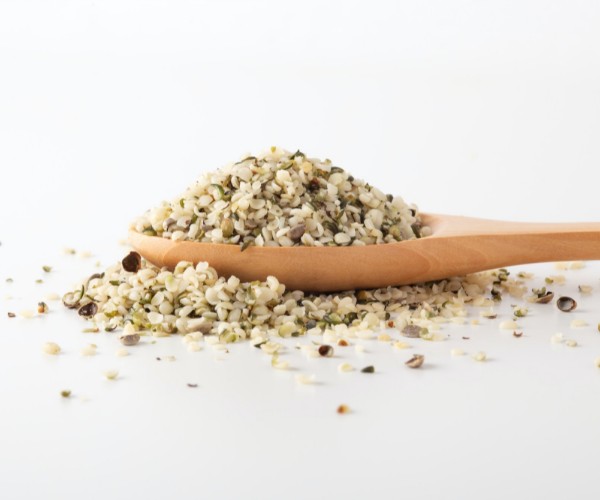
Potential risks of hemp seeds
Hemp seeds are generally recognized as safe by the FDA. Like every food, you should consume them in moderation to avoid the possible side effects.
The fat content in hemp seeds comes primarily from its essential fatty acids, eat them in moderation to meet your recommended daily consumption of fat ( 44 to 77 grams of fat per day if you eat 2,000 calories a day ). High fat intake can cause nausea or diarrhea.
Many people wonder if they will get high from consuming hemp seeds. But this is not likely to happen. Hemp seeds don’t naturally contain significant levels of THC, the psychoactive component.
Food grade strains of hemp must contain less than 0.3% THC by weight. Some studies have noted that they may not be free of this compound entirely. The higher levels may be due to contamination during processing.
Other things to consider before you add hemp seeds into your diet:
Pregnancy concerns
There isn’t enough clinical research to show that hemp is safe either topically or orally for pregnant women or breastfeeding. So, it is not recommended.
Medication interference
If you are taking certain medications such as estrogen, ACE inhibitors, or antihypertensive medications, speak to your doctor before consuming hemp seeds.
Digestive problems
The fiber in hemp seeds can cause digestive problems like constipation, bloating, or nausea if you consume large amounts of these seeds. To avoid this kind of problem eat hemp seeds in moderation and drink plenty of water to avoid gut problems.
How much hemp seeds should you eat daily?
You can start with 1 tablespoon of hemp hearts daily and increase after some period to a standard serving for seeds: 28-30 grams or 3 tablespoons.
Best ways to add hemp seeds to the diet
Eating hemp hearts or shelled hemp seeds is so simple. They have a rich nutty flavor and they blend well in salads, smoothies, spreads, oatmeal. You can sprinkle a spoonful or two on top of cereal or yogurt.
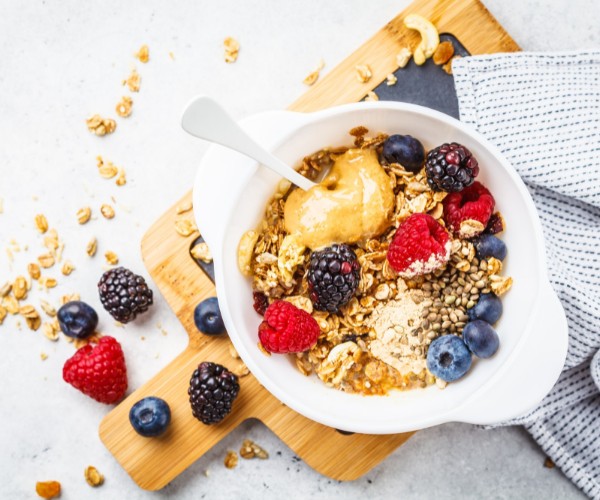
People with gluten sensitivity can use hemp seeds as a substitute for breadcrumbs to coat fish or chicken. Also, just like you blend almonds and water to make almond milk, you can do the same with hemp seeds to make hemp seed milk.
This is a great alternative to dairy milk and you can make it on your own or it is simple to purchase this organic hemp milk here from Amazon.
Hemp seeds are used today to make several products such as:
Hemp seed oil – Best way to use hemp seed oil is as a finishing oil rather than as a cooking oil. Drizzle it on plates of pasta and salads or other dishes.
Hemp butter – Made from grounded hemp seeds this hemp butter, which you can consume like you would eat almond or peanut butter.
Hemp protein powder – This is an excellent plant-based protein powder that supplies omega-3s, magnesium, iron, and essential amino acids.
If you haven’t cooked with hemp seeds and don’t know how to add them into your daily recipes here is an interesting article where you can find 18 creative and delicious hemp seed recipes!
How to store hemp seeds
When you open the package you can expect a bag of hemp seeds to last for about a year in a refrigerator or freezer. If you keep a package in your pantry the shelf life will be more like 3 to 4 months.
The best way to store hemp seeds is to put them in an airtight container and refrigerate them to extend their shelf life. If your bag of seeds smells rancid, toss them they are not good for eating.
Common questions and answers
Are hemp seeds gluten-free?
Hemp hearts are naturally gluten-free. Some hearts may be contaminated with gluten-containing crops. So, verify your hemp hearts are gluten-free by looking for indications on the package. A certified gluten-free logo on the packaging is third-party verification your food is gluten-free.
Can dogs eat hemp seeds?
Yes, dogs can eat hemp seeds, it provides a variety of benefits to your dog, that is why you should include them in their diet.
Do hemp seeds contain THC?
Hemp contains less than 0.3% THC by dry weight which is the norm by governments around the globe. This amount of THC is not enough to create a psychoactive effect, and this has been verified by multiple food research institutions.
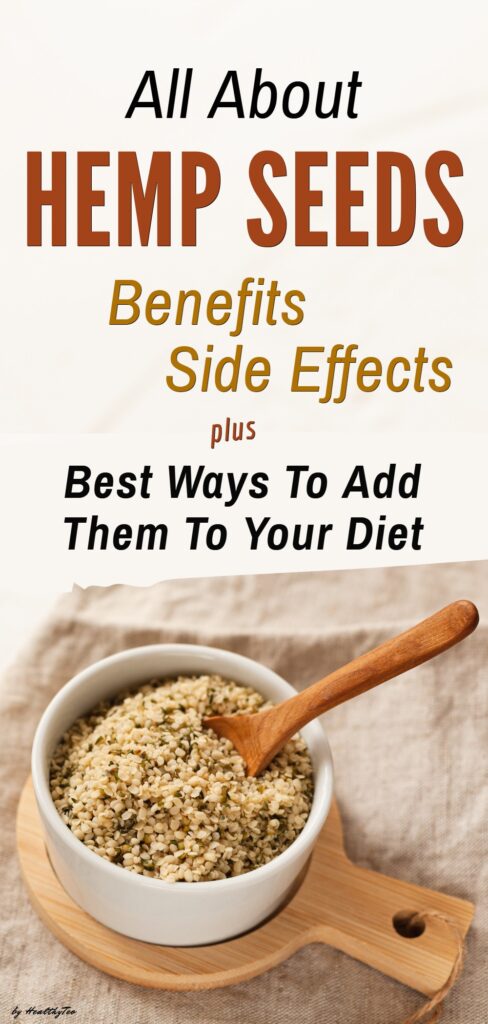
Final thoughts about benefits of eating hemp seeds
Hemp seeds or hemp hearts provide excellent nutritional value and they are rich in healthy fat, high-quality protein, and several minerals. The benefits of hemp seeds include improving heart and digestive health, promoting skin, hair, and nail health, and boosting the immune system.
These edible and delicious seeds can be eaten raw or added to various meals. They can be added to any breakfast bowl, smoothie, shakes, salads, etc.
You can also find great and healthy products on the market made from hemp seeds such as hemp mils, hemp seed oil, or hemp powder.
Finally, even hemp seeds are so healthy and good for you, avoid eating too much because there are some side effects that we’ve noticed above here in the section for side effects of hemp seeds. Every food eaten in moderation is good for you.
If you are allergic to nuts it is good to consult with your health provider before starting adding hemp seeds into your diet!

